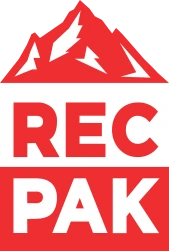
Fueling the Fast Lane: How RecPak Powers Baja Racing's Toughest Challenges
Share
When Travis Engelhardt heads into the Baja desert with his chainsaw, GPS, and backpack, he's not preparing for a casual weekend adventure. As the course preparation specialist for Concrete Motorsports, Travis spends days in some of Mexico's most unforgiving terrain, clearing brush, scouting lines, and building shortcuts that could mean the difference between victory and defeat in races like the legendary Baja 1000.
From Aviation Dreams to Desert Racing
Travis's path to off-road racing wasn't straightforward. After a spinal condition derailed his dreams of becoming a Marine Corps helicopter pilot, he spent years working in aviation before a chance encounter changed everything. While detailing aircraft at a small Texas airfield, he started cleaning a customer's dust-covered black Raptor, a truck that belonged to his future boss, a concrete manufacturing executive with a passion for trophy truck racing.
That simple act of customer service opened the door to an entirely different world. What started as managing logistics and keeping coolers stocked evolved into one of the most demanding roles in off-road motorsports: creating the secret cut lines that allow trophy trucks to shave precious minutes off their race times.

The Brutal Reality of Baja Racing
Trophy truck racing in Baja isn't like NASCAR or Formula One. These 1100-horsepower machines blast through the Mexican desert at speeds exceeding 140 mph over unforgiving terrain, covering distances up to 1,300 miles in races like the Baja 1000. The courses wind through thick brush, rocky mountain passes, and scorching desert flats where temperatures can hit 112 degrees.
Travis's job is to prepare the course before the race even begins. He drives a Polaris or RZR deep into the backcountry, miles from civilization, spending 10 to 20-hour days clearing obstacles, moving rocks, cutting tree limbs, and scouting alternative routes. He's often alone, working in environments where there's no backup, no convenience stores, and no easy exit if something goes wrong.
The physical demands are relentless. Travis might spend hours hiking through dense brush with a chainsaw, building a one-mile cut line that takes seconds for the trophy truck to traverse but hours to perfect. He's constantly moving, constantly working, in heat that sneaks up on you in the dry desert air. One wrong calculation about hydration or nutrition, and heat exhaustion becomes a real threat.
"You're getting the vitamins, magnesium for the muscles, salt for your electrolytes," Travis explains. "You're getting more things that your body needs when you're in these high stress, high output environments that other snacks just cannot give you, or you'd have to carry so much more."
The Space and Weight Problem
In pre-running and course preparation, every cubic inch of space matters. Travis's Polaris carries spare tires, extra fuel tanks, chainsaws, an iPad for GPS tracking, and basic tools. There's a small red Arctic cooler that holds maybe 12 bottles of water and limited space in door pouches for snacks.
Before discovering RecPak, Travis relied on the typical arsenal: Quest cookies, protein bars, beef jerky, Clif energy blocks. The problems were consistent. Energy bars melted in the heat. Snacks were sugar-heavy and left him feeling sluggish. MREs were too bulky and came with unnecessary extras. Nothing provided complete nutrition without taking up precious space or requiring him to stop his work.
A Game-Changing Solution
When team driver Harley Letner handed Travis his first RecPak samples at race check-in, the impact was immediate. Here was a complete 700-calorie meal that fit in his backpack, required only water, and delivered balanced nutrition designed by sports nutritionists. No cooking, no stopping, no compromise.

Now, Travis packs four to six RecPaks in his backpack for every mission into the desert. When he's a mile down a trail clearing brush and doesn't want to waste time hiking back to the Polaris for food, he pulls out a pouch, adds water from his bottle, and keeps working.
"It didn't feel heavy on my stomach, didn't make me feel sluggish or bloated," Travis recalls from his first experience with RecPak. "I wasn't stuffed and I wasn't still hungry. It just took the hunger away and took kind of an exhaustion factor away. I felt replenished, almost."
The liquid form means no gastric distress while he's physically exerting himself. The 42 grams of protein, essential vitamins, and electrolytes keep his muscles functioning and his mind sharp through marathon days of physical labor.
The coffee flavor has become his go-to for early morning missions, providing just enough caffeine for focus without jitters. The compact pouches mean he can carry backup nutrition without sacrificing space for critical equipment.
For Travis, the simplicity is what makes all the difference. "I don't have time to stop at what I'm doing. I can just make it, drink it, and go. And that is just awesome. I just can't describe how handy these can be."
When Every Second Counts
In Baja racing, the margins between winning and losing are razor-thin. Travis's work happens in the shadows - clearing the path for drivers who will blast through at speeds he can barely comprehend. But his preparation is critical, and that preparation demands he stay at peak performance for days on end in conditions that test every system in his body.
As Travis puts it: "If we break down 250 miles from civilization and you've got a couple of those bad boys and a couple bottles of water, you're going to make it. You won't starve, you won't die of dehydration, your muscles won't cramp up. No matter what, you'll be taken care of."
In the high-stakes world of Baja racing, that kind of reliability isn't just convenient… it's essential.
